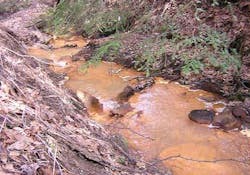Southern Coal Corporation to reduce water pollution from mining operations in Appalachia
WASHINGTON, OCTOBER 5, 2016 -- The U.S. Environmental Protection Agency (EPA) and the U.S. Department of Justice (DOJ) recently announced a settlement with Southern Coal Corporation and 26 affiliated mining companies that requires the companies to make comprehensive upgrades to their coal mining and processing operations to prevent discharges of polluted wastewater from their mines in Appalachia. The estimated cost of these measures is $5 million.
The settlement also requires the establishment of a $4.5 million letter of credit and a standby trust that will guarantee sufficient funding for, and a mechanism to accomplish, compliance with the Clean Water Act and the work the companies have agreed to perform under the settlement, should the companies fail to do so. The companies will also pay a $900,000 civil penalty, divided among the federal government and the four state co-plaintiffs, Alabama, Kentucky, Tennessee and Virginia.
The settlement resolves alleged violations of state-issued Clean Water Act National Pollutant Discharge Elimination System (NPDES) permits by illegally discharging various pollutants at the companies' mining and processing operations in Alabama, Kentucky, Tennessee, Virginia and West Virginia and violations of the companies’ legal responsibilities to sample the quality of their discharges to rivers and streams. The estimated annual pollutant reductions through implementation of the settlement is approximately five million pounds.
"Discharging pollution from coal mining into waterways is a serious threat to clean water, and that's why EPA stepped in on behalf of communities across Appalachia," said Assistant Administrator Cynthia Giles for EPA's Office of Enforcement and Compliance Assurance. "Company-wide compliance programs like the one Southern Coal Corporation will establish are critical to protecting our lakes, rivers and streams and the people who depend on them."
"This settlement is designed to bring the companies into compliance with the Clean Water Act and requires actions that should prevent future violations," said Assistant Attorney General John C. Cruden for the Justice Department’s Environment and Natural Resources Division. "We appreciate our state partners working with us on the consent decree and for their joint oversight efforts with us in the future."
Under the settlement, Southern Coal Corporation and its affiliated mining companies must implement a series of measures to ensure compliance and prevent future Clean Water Act violations at their coal mining operations, including:
* Implementing a company-wide, EPA-approved environmental management system.
* Maintaining a centralized data management system to track audit results, violations, water sampling data and compliance efforts.
* Constructing a public website for posting documents such as NPDES permits, discharge monitoring reports, water sampling data, effluent violation information, notices of violations and compliance orders.
* Conducting regular internal and independent third-party environmental audits and outlet inspections and undertaking necessary alterations or maintenance measures.
* Providing training for all employees whose responsibilities include environmental compliance and contractors hired to perform duties required by the consent decree.
* Paying a civil penalty of $900,000.
* Paying escalating stipulated penalties if Clean Water Act permit violations continue to occur.
* Providing for a letter of credit and a standby trust and trustee to ensure that there is sufficient money and a mechanism to achieve compliance with the consent decree and the Clean Water Act, if the companies fail to perform.
The government complaint filed concurrently with the settlement alleged that over the last five years, Southern Coal Corporation mining and processing operations have violated discharge limits for pollutants including iron, total suspended solids, aluminum, pH and manganese in their state-issued permits. The complaint also alleged that Southern Coal Corporation failed to submit complete and timely discharge monitoring reports, made unauthorized discharges and failed to respond to EPA requests for information. EPA discovered the violations through investigations and inspections of several Southern Coal Corporation mining operations, reviewing various information provided by the companies and coordinating with the affected state governments.
Created in 1972 by the Clean Water Act, the National Pollutant Discharge Elimination System permit program addresses water pollution by authorizing states, with EPA oversight, to issue permits that set strict limits for the discharge of certain types of pollutants by certain types of entities. The proposed consent decree, lodged in the U.S. District Court for the Western District of Virginia, is subject to a 30-day public comment period and approval by the federal court. Information about submitting a public comment is available at: www.justice.gov/enrd/consent-decrees
